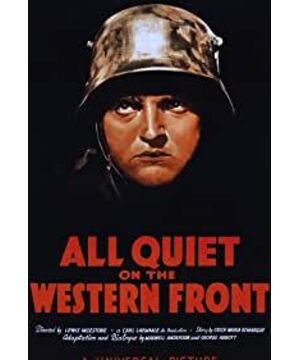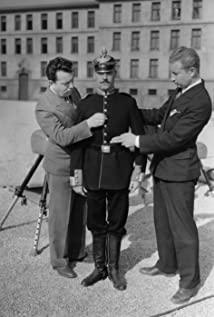The first time I heard about its name was in the strange story, because I was quite interested in anti-war films and that history, so I searched for it. At first I didn't realize it was from 1930, black and white, and a little uncomfortable. It took two hours to read it, and the mood was heavy and a little hopeless.
Great works can always reflect an era, a social phenomenon, or a fact. This film started in 1930, the end of World War I and World War II have not yet begun, but unfortunately it was banned at that time. I've always wondered, would history be a little different if more people saw it at the time, if fewer people went to war? When I was a child, there was a domestic animation I liked very much, called The Adventures of Luoluo: The Adventures of Variety Machine Beasts. There is a sentence in it that impressed me deeply: "There are no winners in war, only losers." That's right, there will be injuries in wars , there will be death. It is the innocent and incited people who are always hurt by the war. How many people like Paul have been encouraged by society to go to the front line and even die for the country. It was not until the baptism of the war that we really knew the horror of war. Sadly, society has been cultivating such a reserve army and constantly "filling in". There is a saying in the film, "There are only 20 people left in the 150 people in Camp No. 2 after the inspection last night, but they will be filled soon." What to make up for it!
But why do things like war happen? There is no love for no reason in the world, and there is no hate for no reason, so there is no war for no reason. The fuse of World War I was the assassination of Sarajevo, but the long-standing grievances between the empires were due to the struggle for world hegemony and colonies. The war as I understand it stems from two reasons. One is that one country takes the initiative to attack another country, and the attacked country can only fight back, otherwise it will wait to be captured. Such as China and Japan in World War II (fighting for eight years), or Denmark and Germany (fighting for six hours). The second is to compete against each other and seize fiefs, such as France and Germany. Therefore, it can be seen that the reason why the war occurs mainly depends on the will of the person in power. After publicizing it in the society and recruiting troops, there will naturally be an army. Fortunately, the rulers of the 21st century understand that the negative impact of war is too great, so they have replaced it with civilized methods, such as trade wars. But there are exceptions, such as the perennial wars between Arab countries, and the US intervention in the government affairs of some small countries that led to wars. When a strong country hits you, as a weak country, do you want to fight back? This is an unsolved question. You can protect your citizens without a fight like Denmark, or you can fight eight hard years like China and resolutely protect national sovereignty and territorial integrity. It depends on the choice of the people themselves, and the level of education is also greatly affected. After all, most people have never been on the battlefield and have no concept of danger at all. The so-called newborn calf is not afraid of tigers, because the ignorant is fearless. What is certain is that most of the nationals in our country's anti-Japanese squad were also driven by the whole society as in the film and went to the battlefield with full of blood. At present, many people may choose to protect themselves, but fortunately, we no longer need to face such a choice.
What I just talked about is only wars between countries, and there are also some small-scale wars, such as terrorist organizations, independent organizations, etc. Hitler, the initiator of World War II, actually belongs to this category. Their goal is not to fight for land, but to maintain their beliefs. For example, Taiwan independence launched all kinds of riots just because they wanted Taiwan to become independent, and Hitler launched World War II to eliminate low-class people. In fact, the power of this belief is stronger than that of the first type of hegemony, because this is their worldview, and it is the goal they are willing to work hard for their whole lives, no matter what the cost. Consider the power of religious belief. That's why, even now, this kind of organization is still alive and well. Another small factor is preconceptions. If all Taiwanese first come into contact with the theory that Taiwan is an independent country (through education), then they will firmly believe that this is true and that anyone who tries to integrate Taiwan into China is their enemy, which is understandable why Taiwanese and mainland Chinese are so hostile. It is conceivable that the head of an organization has instilled such a theory into his followers that the organization's beliefs will be very strong, and even if they know the consequences, they are willing to devote themselves to it, such as some cults and pyramid schemes.
In conclusion, I think that the only way to avoid war at the source is to have an open mind. Only when your thinking is not limited and can look at things dialectically and comprehensively, you will realize that the solution to a problem is not only war. For example, the strength of a country can be achieved at the level of economy, culture and technology, and does not need to be determined by territorial size. When your culture and education develops, you will cultivate a wise nation and reserve talents for the development of the country, and when your talents, technology and economy develop, you have nuclear weapons, and you do not need to fear other countries to attack You, and you, as a peace-loving country, can also choose not to attack other countries, the world is united.
All Quiet on the Western Front is actually a relatively well-known anti-war movie, but it's not as famous as the Boys in Striped Pyjamas, The Beautiful Life, or Schindler's List, which is also a black-and-white movie. I think it may be mainly because the plot is not so ups and downs. As a face-blind person, I often remember a few protagonists. In addition, what it brings to people is mainly reflection, rather than the eternal hot topics such as human nature, touching, warmth, family, friendship and love conveyed by other films. But I think as an anti-war film, it's not inferior to other great films at all.
There are some very shocking and impressive scenes in the play. For example, Muller who got the boots, the camera showed him looking at his new boots happily, but suddenly turned to his death. Soldiers who clearly suffered from PTSD early in the war. Peter killed his enemy in the trenches, comforting him, yelling rudely why he didn't die sooner, and comforting him that he would soon be home alive. Peter carried Kate, who had a broken leg, on his back, unaware that he was dying from a stray bullet. Peter's hand holding the butterfly couldn't go any further. And the last shot, the main scene is the soldiers smiling and looking back, but the background is densely packed with cross tombstones.
Hope for world peace.
View more about All Quiet on the Western Front reviews











